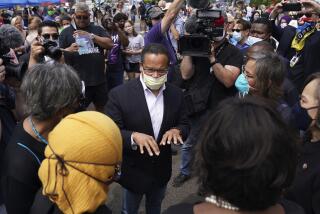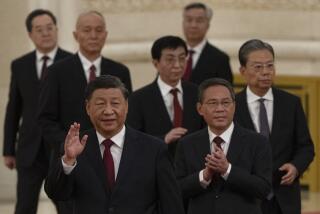Get Rich and Succeed, Chinese Party Urges : Economy: Approval of a wealthy class as a spur to reform contrasts with Communist egalitarianism.
- Share via
BEIJING — In a far-reaching statement of economic principles, the Chinese Communist Party has for the first time boldly endorsed the development of a wealthy class as a necessary consequence of accelerated economic reform in the country.
To foster competition and reward individual effort, a report issued Tuesday by the party’s policy-making Central Committee discarded the long-held notion of income “egalitarianism.” It argued the need to “break away from egalitarianism, so as to implement the principle of more pay for more work and rationally widen the income gap.”
Those who have become rich, the report said, “should be encouraged to lead forward and support those lagging behind.”
The recognition of inevitable income gaps between individuals and between rich and poor regions in China, a break with traditional Communist theory and propaganda, was one of several bold policy positions contained in the 25-page report emanating from the third plenary session of the 14th Central Committee here last week.
Released simultaneously in Chinese and English, the report was a ringing endorsement of accelerated conversion from a Stalinist-model central economy to the “socialist market economy” advocated by 89-year-old paramount leader Deng Xiaoping and the wing of the party advocating economic liberalization.
Coming only days before Chinese President Jiang Zemin and President Clinton are to meet for the first time in Seattle, the report was clearly timed to impress the Americans with the seriousness of economic and political reform efforts in China. The sweeping nature of the economic reforms outlined in the report could make it more difficult for the Clinton Administration to follow through with its threat of trade restrictions if China fails to make progress in human rights areas.
The report helped boost the status of Jiang, who is also general secretary of the Communist Party, as he goes into the Seattle summit.
Except for Deng, whose name was invoked six times in the report, and the late Mao Tse-tung, mentioned once, Jiang, 65, was the only other individual named. Jiang is generally associated with the reform wing of the party.
Conspicuous by his absence was Chinese Premier Li Peng, generally identified as the leader of the conservative, hard-line faction of the party.
At a time when longtime leader Deng is in failing health and leadership succession is the political preoccupation of the land, such details may provide a glimpse of the course China will take after Deng’s death.
Setting a tone that would please U.S. trade specialists, the report several times advocated stricter enforcement of regulations against counterfeit merchandise produced in China and called for strengthening of customs operations to prevent illegal transshipment of goods, primarily textiles, that U.S. officials estimate totals $2 billion annually.
Foreign economists and investors will be pleased by objectives stated in the report calling for the People’s Bank of China, the country’s central bank, to allow the deposit and loan interest rates of commercial banks to “float freely within a specified range.”
On the human rights front, the party leaders were less forthcoming, although the government was encouraged to continue recent policies allowing more freedom in religious observance, a key element in the U.S. demands.
The report spoke of democracy only at the “grass-roots” level, reflecting a go-slow attitude that has prevailed in party ranks since the 1989 crackdown at Tian An Men Square.
More to Read
Sign up for Essential California
The most important California stories and recommendations in your inbox every morning.
You may occasionally receive promotional content from the Los Angeles Times.













